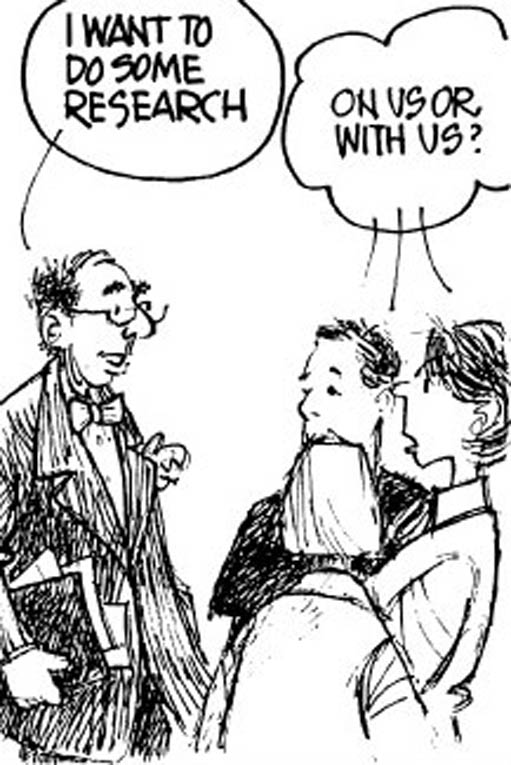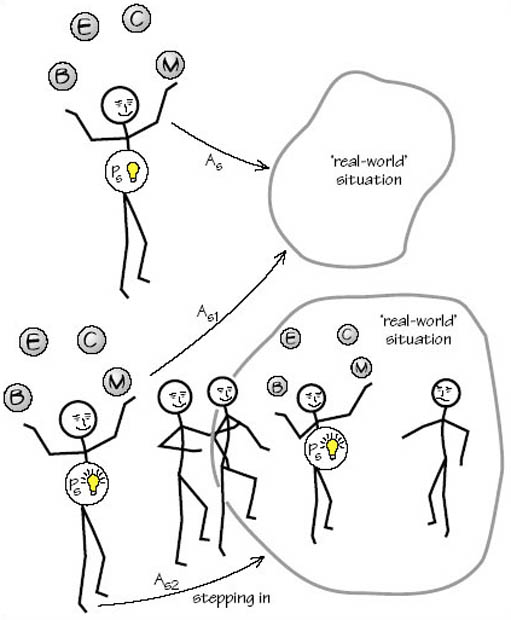16.5 Where does the systems practitioner stand in relation to a system of interest?
Systems practice may be carried out individually or as part of a team. In doing action research – which is a form of managing – an important question is: On us or with us? (Figure 47). This question seems pertinent to the process that led to the establishment of the Child Support Agency as described in the case study.
The answer to the question, whether the action research is carried out by an individual or a group, leads to different modes of systems practice. These modes of practice are related to the choices the aware systems practitioner has at their disposal (Figure 48).

The mode of practice also relates to whether the systems practitioner attempts to take an objective stance, by standing outside the system of interest, or whether they see themselves as a co-creator of a system of interest with stakeholders. This is portrayed as the aware systems practitioner stepping into the so-called ‘real world’ situation with another stakeholder in Figure 48. The latter is the approach outlined by Patricia Shaw in her intervention from a complexity perspective. It is also the way in which many of the systems approaches described in Part 3, Section 5.4 can be contextualised.
One additional challenge you may face in developing your practice is to allow for the emergence of new insights from the use of systems methods in their entirety (i.e. as conceptualised by their developers) as opposed to picking and using parts of them. Based on my own experience I would argue for attempting them in their entirety first and until they begin to feel familiar, or embodied.

SAQ 17
Each of the following scenarios relates to an aspect of being a systems practitioner juggling the B, E, C and M balls. Decide what ball has been dropped by the juggler in each of the scenarios and suggest some possible implications for systems practice.
(a) After meeting with the managing director and the board I felt a strong personal dislike for the policies adopted by the client organisation. However, I did not let this trouble me for long and pushed it to the back of my mind because I needed the money.
(b) People at work know I have been doing an OU Systems course. One day, my boss saw by accident a rich picture I had done and asked me to explain it. Because it related to my work I was apprehensive but she was clearly impressed. Later, I was asked by my boss to assist a senior group in my department to draw and compare rich pictures of their situation. Because I had a lot of work at the time and felt really pressurised, I did not do much preparation for the event. It turned out to be a real disaster.
(c) I recently became aware of a really top-class modelling package that I subsequently bought. But I have not had time to use it much since then. I am planning to use it in the consultancy I have next week so that I can use the experience to develop my own skills.
(d) Last year I visited X as a tourist. I was appalled at how unproductive the farming was given the good soil and rainfall. My background is in agriculture, and given that I am now retired, I have decided to join a senior-volunteer programme. I hope I can return to X because I am pretty sure I know how things can be improved.
Answer
(a) I regard this scenario as an example of dropping the B ball. By pushing concerns to the back of their mind the practitioner may be avoiding an ethical issue that has longer term implications for their practice and business. Because they have not faced up to the issue, the practitioner may also risk carrying a lot of emotional baggage into the project, which affects their performance and, if it is anger, may be conveyed to the clients non-verbally anyway.
(b) The most obvious ball that has been dropped in this scenario is the M ball; the practitioner has not taken responsibility for managing in the situation. Managing might have ranged from declining the offer to negotiating more time to prepare or to raise questions about contextualising rich pictures – how would it be different from the practitioner's own prior use of them? Was the new context appropriate? For me this scenario illustrates how part of the managing role is also looking after C, E and B.
(c) This is an example of dropping the C ball: the consultant is concerned with developing their own expertise in using the modelling package regardless, it would seem, of the context. Put another way the consultant is imposing the modelling approach onto the context.
(d) This is an example of dropping the E ball: of superficially engaging with the context (unproductive agriculture in country X) in terms of a difficulty capable of being solved from the perspective of the visitor. It is also an example of dropping the B ball because the person is unaware of their own traditions of understanding. I might add I am not saying the person in this case does not have potentially useful experience, but I am questioning how that experience might be used to best effect.
